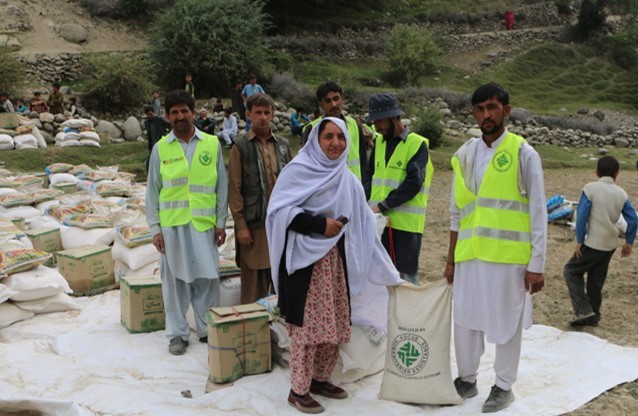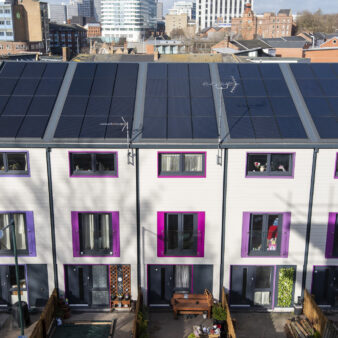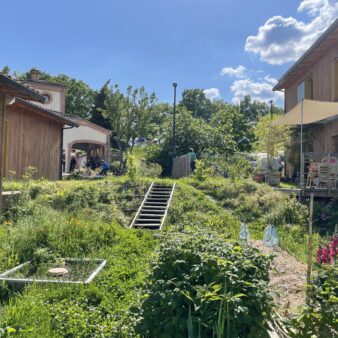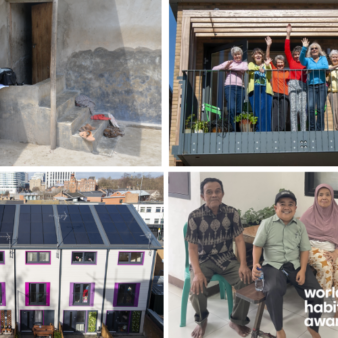
How can 1 billion people who live in broader mountainous regions combat the climate emergency and remain living safely in their communities?
World Habitat and the Aga Khan Agency for Habitat – who won a Gold World Habitat Award in 2020 – answered this question at a special event as part of COP26 on Monday 8 November 2021 in Glasgow.
This event focused on how indigenous communities in mountainous regions – who are disproportionately affected by the climate emergency – can adapt to live safely and thrive. In the Himalayas, Hindu Kush, Karakoram and Pamir mountains, temperatures are rising three times faster than global averages. These areas – home to some of the most isolated yet dynamic communities – are especially vulnerable to earthquakes, floods and other hazards that have caused catastrophic damage in recent years.
Facilitated by World Habitat, the event featured a documentary about affected communities living on the frontlines of the climate crisis, followed by a panel discussion featuring:
- Maimunah Mohd Sharif, Executive Director of UN-Habitat and Final Judge of the World Habitat Awards;
- Malik Amin Aslam, Minister and Special Advisor to the Prime Minister of Climate Change, Pakistan; and
- Khalid Khurshid, Chief Minister of Government of Gilgit Baltistan, Pakistan
- Onno Ruhl, General Manager of the Aga Khan Agency for Habitat; and
- Louise Winterburn, Deputy Chief Executive, World Habitat.
The panel discussed how we can prepare for and respond to worsening climate crises – highlighting AKAH’s work in Pakistan to harness local indigenous knowledge, alongside technology, to create effective solutions that respond to the climate emergency, enabling people to build safer homes and communities.
This includes using the latest advances in technology to conduct hazard, vulnerability and risk assessments (HRVAs) and develop community-based disaster management and habitat development plans.
Onno Ruhl, General Manager of the Aga Khan Agency for Habitat, said:
“There are nearly one billion people living in mountain areas across the world. This event will be a vital opportunity to learn from others who work and live in mountain regions, and to also share our own knowledge and experiences. These communities are the custodians of natural resources critical to our planet, including the water towers upon which half of humanity relies. Conserving and improving mountain habitats and ecosystems are key drivers in the fight against climate change.
“It is crucial that we empower these communities to build a better future. We have to adapt to the climate and we must do so in a way that tangibly improves peoples’ homes, lives, and habitat. We can avoid catastrophic consequences for people – but only if we act…and act now.
“The Aga Khan Agency for Habitat and its partners are working with those most vulnerable to help them build resilience through international best practices and decades of on-ground experience that have already proven to transform the lives of countless individuals, families, and communities – and to protect nature.
“Through this watershed moment of COP 26, we pledge to share our knowledge to unite, amplify and accelerate collaborative actions for climate change adaptation across the world, particularly where they are needed most.”
Rubina is from a female-headed household. Their home was one of 250 made safer by AKAH from the dangers of unpredictable debris flow. She said:
“Our life was really worrying and uncertain before the intervention [from Aga Khan Agency for Habitat] to make our home safer. My whole family used to spend restless days and nights fearing that the debris flow may destroy the houses and even take our lives. It was agonising as we had to carry my paralysed mother-in-law, my late father-in-law and my two young children and run for our lives to the safer sites.
“Now that the debris flow has a proper channel, our house and family are much better protected, and our peace of mind has been restored.”
Louise Winterburn, Deputy Chief Executive at World Habitat, said: “Many of the world’s poorest communities are on the front-line of the climate emergency and either have to live in unbearable conditions – or leave. What the Aga Khan Agency for Habitat has achieved in Pakistan – through using the very latest technology in harmony with indigenous knowledge – is remarkable. And this has meant many thousands of people can remain in their communities, while adapting to the immediate consequences of the climate emergency.
“This solution is one that could be adopted in similar places across the world, benefiting millions of people. Our aim is to make that happen, starting with this event at COP26.”
In Pakistan AKAH has worked with over 50,000 volunteers (nearly 40% of whom are women); conducted HVRAs in almost 800 settlements (home to over one million people); and provided over 20,000 households with technical assistance to prepare for disasters and prevent damage when they occur.
A key part of the event discussion was about how their processes and best practices can be transferred and replicated to other areas facing similar climate extremes.
The event took place at 2pm on Monday 8 November 2021 – Click here to watch the full replay on the COP26 You Tube Channel – which starts after 5 mins




Join the discussion